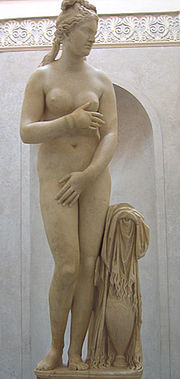Venus
| Line 1: | Line 1: | ||
{{LanguageBar|{{PAGENAME}} }} | {{LanguageBar|{{PAGENAME}} }} | ||
| − | '''Venus''' was originally a goddess of Spring, flowers and vines. Her Latin name defined her character, venerari. To entreat, charm. After the military defeat at Trasimene, the Sibylline Books were consulted and a temple to Venus of Eryx in Sicily,Phonecian Astarte, was dedicated on the Capitoline hill in 217 B.C.E. | + | '''Venus''' was originally a goddess of Spring, flowers and vines. Her Latin name defined her character, venerari. To entreat, charm. After the military defeat at Trasimene, the Sibylline Books were consulted and a temple to Venus of Eryx in Sicily, Phonecian Astarte, was dedicated on the Capitoline hill in 217 B.C.E. If was exceptional for a foreign deity to have a temple in the heart of the Capitoline. Capitoline Venus' cult did not have the ritual prostitutes famous in Eryx, rather the cult was Roman, and linked to the Romans' Trojan origins. |
Another temple was vowed Venus Erucina extra Portam Collinam, the 23 of April 184 B.C.E. The cult statue, Venus with a dove and Amor, was supposedly a copy of that on Mt. Eryx. Outside the Pomerium, Venus' cult maintained it's Sicilian character. | Another temple was vowed Venus Erucina extra Portam Collinam, the 23 of April 184 B.C.E. The cult statue, Venus with a dove and Amor, was supposedly a copy of that on Mt. Eryx. Outside the Pomerium, Venus' cult maintained it's Sicilian character. | ||
Revision as of 04:02, 5 December 2007
Home | Latíné | Deutsch | Español | Français | Italiano | Magyar | Português | Română | Русский | English
⚜⚜⚜ Site Index - Key Pages ⚜⚜⚜
Venus was originally a goddess of Spring, flowers and vines. Her Latin name defined her character, venerari. To entreat, charm. After the military defeat at Trasimene, the Sibylline Books were consulted and a temple to Venus of Eryx in Sicily, Phonecian Astarte, was dedicated on the Capitoline hill in 217 B.C.E. If was exceptional for a foreign deity to have a temple in the heart of the Capitoline. Capitoline Venus' cult did not have the ritual prostitutes famous in Eryx, rather the cult was Roman, and linked to the Romans' Trojan origins.
Another temple was vowed Venus Erucina extra Portam Collinam, the 23 of April 184 B.C.E. The cult statue, Venus with a dove and Amor, was supposedly a copy of that on Mt. Eryx. Outside the Pomerium, Venus' cult maintained it's Sicilian character.
She was also Venus Genetrix, mother of the Roman people through her son Aeneas, who was also an ancestor of the Julii. Both Julius Caesar and Hadrian dedicated temples to Venus Genetrix. Hadrian's still stands near the Flavian amphitheatre. She has darker aspects too, such as Venus Libitina, an aspect of Venus associated with the extinction of life force. Here is a full list of her epithets: Calva, Capitolina, Erucina, Felix, Fisica, Frutis, Genetrix, Iovia, Martialis, Myrtea, Obsequens, Plagiaria, Syntrophus, Verticordia, Victrix. Sources: "La Religion Romaine de Venus" Robert Schilling "
from Lucretius' De Rerum Natura:
PROEM
Mother of Rome, delight of Gods and men,
Dear Venus that beneath the gliding stars
Makest to teem the many-voyaged main
And fruitful lands- for all of living things
Through thee alone are evermore conceived,
Through thee are risen to visit the great sun-
Before thee, Goddess, and thy coming on,
Flee stormy wind and massy cloud away,
For thee the daedal Earth bears scented flowers,
For thee waters of the unvexed deep
Smile, and the hollows of the serene sky
Glow with diffused radiance for thee!
For soon as comes the springtime face of day,
And procreant gales blow from the West unbarred,
First fowls of air, smit to the heart by thee,
Foretoken thy approach, O thou Divine,
And leap the wild herds round the happy fields
Or swim the bounding torrents. Thus amain,
Seized with the spell, all creatures follow thee
Whithersoever thou walkest forth to lead,
And thence through seas and mountains and swift streams,
Through leafy homes of birds and greening plains,
Kindling the lure of love in every breast,
Thou bringest the eternal generations forth,
Kind after kind. And since 'tis thou alone
Guidest the Cosmos, and without thee naught
Is risen to reach the shining shores of light,
Nor aught of joyful or of lovely born,
Thee do I crave co-partner in that verse
Which I presume on Nature to compose
